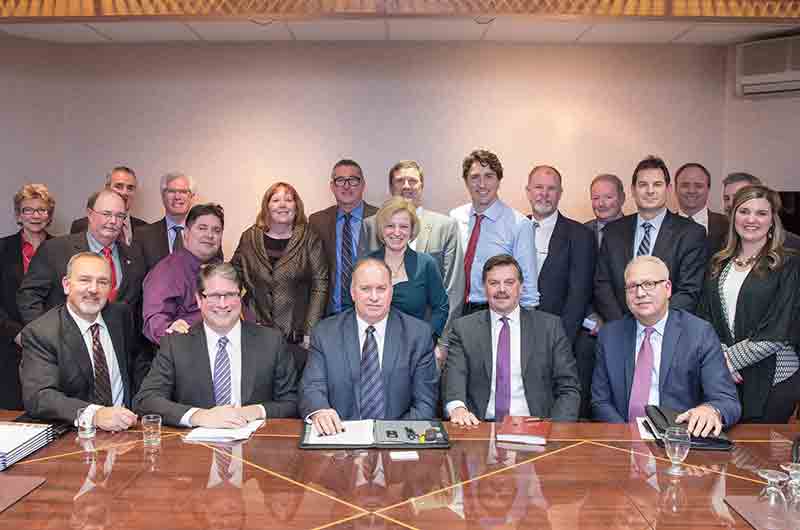The Backbone of Canada’s Oilfield Services Industry
By Rajitha Sivakumaran
September 2014 brought with it a catastrophic supply-demand imbalance in the oil and gas industry. As one of the top exporters of crude oil, the Canadian petrochemical sector suffered major losses after OPEC’s decision to maintain oil production despite a dwindling global demand. More than a year and a half later, conditions have yet to improve as industry giants continue to cut staff. According to the 2015 fourth quarter financial results of the Calgary-based Halliburton Group, an oil and gas services (OGS) company, $192 million was spent on asset write-offs and severance costs, and total revenue was reduced by 28 per cent compared to the year before.
Fortunately for companies such as Halliburton, the Petroleum Services Association of Canada (PSAC) operates as the preeminent voice of the petroleum services, supply and manufacturing sector. Involved in the oilfield industry since the early 1980s, Mark Salkeld, PSAC‘s president and CEO, has led the association for the past five years. With three decades of experience under his belt spanning across four continents, Salkeld ensures that PSAC is committed to supporting member companies with the resources and education needed for continual success. In addition to this, PSAC is a tireless advocate for its members, often liaising OGS companies with governments, communities, the public and the media.
The birth of PSAC
PSAC traces its roots back to 1980, the year the federal government proposed the National Energy Program (NEP) in response to a 160 per cent increase in oil prices. The proposal introduced new taxes on the oil industry, gave Crown oil corporations more power and redirected capital towards the federal government. Representatives from petroleum companies across Canada assembled in Ottawa to advocate changes to the NEP, but did not succeed in persuading the government. The consequences were brutal. As oil prices fell, the energy industry faced a crisis similar to the one we are experiencing today.
“PSAC represents a diverse array of companies in the oil and gas services, supply and manufacturing sectors in Canada… from the giant multinational oilfield service enterprises to the small- and medium-sized local entrepreneurs.”
Deciding that a unified voice was needed to represent and support the petroleum services industry, PSAC was founded on Nov. 20, 1981 by 143 member companies. Although the NEP was put out of commission in 1985, PSAC continued its advocative role. Since then, PSAC has successfully maintained its position as the figurative backbone of the Canadian OGS industry by communicating and advocating on behalf of its members and fostering strong government relations.
Now representing over 200 members, Salkeld spoke proudly, “Our members are the best of the best … the all-star team of oilfield services and we’re recognized globally for what we do.”
As a national trade association, PSAC represents a diverse array of companies in the oil and gas services, supply and manufacturing sectors in Canada, with a particular interest in hydraulic fracturing companies. From the giant multinational oilfield service enterprises to the small- and medium-sized local entrepreneurs, PSAC member distribution spans from northeastern British Columbia to southeastern Saskatchewan and all across Alberta, Manitoba and the Maritimes while its advocacy spans from Victoria to St. John’s — anywhere their voice is needed in Canada.
These companies develop and supply the highly advanced equipment required for “drilling, testing, producing, maintaining and reclaiming crude oil and natural gas wells”.
“We’re 80 per cent in the field and 20 per cent in downtown offices whereas our producer customers are 80 per cent downtown and 20 per cent in the field,” Salkeld said.
“Our members are the best of the best … the all-star team of oilfield services and we’re recognized globally for what we do.” Mark Salkeld, President
Much attention is allotted to the Exploration and Production (E&P) division of the industry, but the OGS sector contributes a staggering $91 billion to the nation’s GDP and employs an estimated 685,623 Canadians. Find out more by visiting psac.ca/resources (http://www.psac.ca/wp-content/uploads/Contrib_OGS_Cdn_Econ.pdf) to download PSAC’s September 2015 report “The Contributions of the Canadian Oil and Gas Services Sector to the Canadian National Economy”.
The current crisis
The ongoing challenges faced by the energy industry have severely impacted not just E&P companies but PSAC members as well. The dropping oil prices have persisted for longer than anticipated and supply continues to soar. For instance, gas storage in Canada has reached the second highest level in its history.
“We are not very hopeful of any significant change in the very near future. There’s no indicators that we look at that are giving us any kind of signals of a positive outcome,” Salkeld said. “I’ve been through five of these and this one is shaping up to be equal to the one I experienced in the early ’80s.” There is hope, however, and Salkeld firmly believes that prices will bounce back.
A conversation with the Prime Minister and some solutions
Last month, Salkeld and the Board of Directors spoke with Prime Minister Justin Trudeau and the Premier of Alberta, Rachel Notley, in the company of several other ministers of the provincial and federal governments.
Salkeld said, “The biggest takeaway was that I honestly believed that the Prime Minister and Premier understand the importance of this industry to the Canadian economy.”
In response to the current drop in oil prices, Salkeld advised a strategy that differs from the current view to expand infrastructure expenditure. He recommended investing in pipelines and getting Canadian products to tidewater instead. He believes that such a move would remedy the unemployment issue more efficiently compared to a monetary handout from the government, particularly if the latter increases national debt. “I’ve got to always remind people that Canadian oilfields services companies are on the leading edge of technology and development for the responsible recovery of our oil and gas resources,” Salkeld said.
“…Canadian oilfields services companies are on the leading edge of technology and development for the responsible recovery of our oil and gas resources.”
Although there is general consensus about the need for further technological advancement to propel Canada forward, the world is very much interested in Canadian technology. Furthermore, Canada has a responsibility in ensuring the reduction of worldwide greenhouse gas (GHG) emissions and one way to achieve this is by globally introducing equipment that will help to replace GHG-emitting fuels.
PSAC is actively pursuing these ventures to bring business and investment opportunities to the nation. Recently, Salkeld went to India, supported by the federal government, to promote trade and investment between Canada and India while simultaneously developing networks for member companies.
“India is very keen on Canadian technology for their resource development as well as opportunities to invest in Canada,” Salkeld said.
Another area of concern is Canada’s undiversified business relations in the oil industry. Although Canada is a major exporter of crude oil, the primary buyer is the United States, which is something Salkeld found to be deeply problematic.
Salkeld said that the U.S. is “just winning big time and they’ve got all the abundance of the Canadian resources getting provided to them at a discount.” Catering to a single business partner is jeopardizing the nation’s energy industry. “That’s not good business and that’s not a good way to run the country in my mind, so it needs to be fixed.” Salkeld, however, is confident that the issue is being addressed at both the provincial and federal levels.
Pipelines and bad publicity
The energy industry has been bombarded with negative publicity in response to environmental concerns over the construction of pipelines, but Salkeld’s recommendations are supported by member companies with strong environmental records run by doctorate-holding executives. Support against bad publicity through awareness campaigns is another way PSAC helps its members. In regards to hydraulic fracturing, PSAC launched a five-year campaign that sought to educate the populace about fracking with the help of experts in the field.
“We submitted papers for the review panels in Newfoundland and in Nova Scotia and we presented to the Senate committee in Ottawa on understanding Canadian resources development,” Salkeld said. “We’re not pushing to burn oil and gas going forward — we have kids and we care about the environment just as much as anybody else — but we’re not going to get there without transitioning to natural gas and then onto renewables.”
To learn more about PSAC, visit www.psac.ca.







